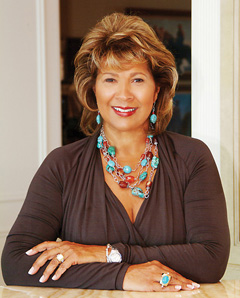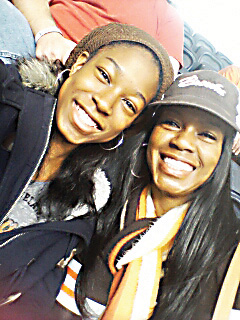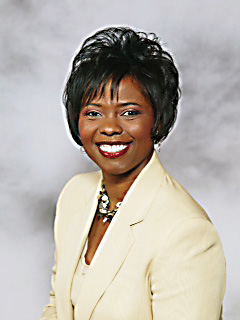Three breast cancer survivors share their personal testimonies
October 7, 2013 by Las Vegas Black Image Magazine
Filed under Extra, Feature
‘There was never any doubt in my mind that I would live’
Three breast cancer survivors share their personal testimonies
BY KIMBERLY BAILEY-TUREAUD
Tina Lewis is president of HRL Group LLC, and owns and operates seven McDonald’s franchises in Las Vegas with her husband, Harold. Recently appointed to the University of Nevada-Las Vegas Foundation Board of Trustees, she also serves on the national board of the Susan G. Komen for the Cure Foundation.
I was diagnosed with breast cancer in June 2000. My story is different than a lot of other survivors because I also was diagnosed with colorectal cancer a year before my breast cancer diagnosis. So, breast cancer was not my first bout with cancer; this made it the second year in a row, which really made it impactful. My breast cancer wasn’t related to the colorectal cancer. It was a separate primary cancer, and really quiet shocking for me. I guess I should say I was totally devastated.
What happened to me is when I finished my treatment for colorectal cancer, I was scheduled to have a mammogram at the end of that same year. The mammogram came back normal, and six months later I discovered a lump in my breast from a self-exam I was giving myself while lying in bed. I knew when I felt my breast, and felt a lump, that it felt different than anything I had felt before in my breast. This is one of the things I feel is so important to know: There are different theories and opinions about self-breast exams, but nobody knows your body better than you. You will know if something is there one month that was not there the previous month. That is why it is so important for us to be advocates for our own health.
So, I felt and discovered something in my breast myself. I remember saying to my husband, “Honey, feel this,” while we lay in bed. He said, “Oh, it’s nothing. Don’t worry about it.” But it struck me totally different. I didn’t mention it to my husband the next morning, but I called my gynecologist and told her to refer me to a breast specialist — one she would go to for her own personal care. I went to the breast specialist, and she did a biopsy that day in her office. The results came back positive, and I indeed had breast cancer.
I had to wait before receiving treatment, in order to undergo tests to determine what kind of breast cancer I had. There are various kinds of breast cancer, and I was diagnosed as having triple-negative breast cancer.
What makes this kind of breast cancer so unique is that the only treatment options are: chemotherapy, surgery and radiation. It is not like breast cancer that is hormone positive — which is progesterone and estrogen positive. For this form of breast cancer, you will be given medication to block the hormones and prevent reoccurrence. With triplenegative, there is no medication; they have to give you chemotherapy, perform surgery and or radiation and you pray that it works. There is still a lot of research that has to be done on triple-negative breast cancer, but I am a triple-negative breast cancer survivor. I did have surgery and I was confident in my oncologist because of what I went through with my colorectal cancer.
Nevertheless, I sought out a second opinion. I would advise any woman who has been diagnosed with any form of cancer — especially breast cancer — to get a second opinion from another doctor. Any doctor worth their weight in gold should respect your need to get another opinion about your health. I had a relatively small tumor that spread to my lymph nodes. It was systemic and had to be treated. I needed chemotherapy, in other words. It is a different medical environment than what I went through 13 years ago. There is new technology, and treatments today that offer disposition of radiation directly to the cancer site — which eliminates radiation exposure to the entire chest area, in my case, for six to eight weeks.
I advise women who receive a breast cancer diagnosis to research and learn as much as possible about the disease. Many people are unaware that men also get breast cancer and the original “Shaft,” Richard Roundtree and Sen. Edward Brooks have had breast cancer. Try to stay away from negative stories; it can give you a negative outlook. My philosophy is that cancer starts with the word “can” — you can get it, and you can survive it. More women are surviving breast cancer than ever before.
Tamara Jackson is an employee at Southern Nevada Health District.
I was originally diagnosed with breast cancer in October 1998. It was two weeks before my 28th birthday. I went through a lumpectomy back then, and received radiation and chemotherapy.It’s been almost 14 years, and I was diagnosed again, in October 2012, with cancer in my right breast. I went for my routine mammogram and it turns out that the cancer is back. The first time it was in my left breast, and this time I opted to get a double mastectomy and have them both removed.
Currently, I am at the point of my breast reconstruction. The first time I was diagnosed with breast cancer, it was very radical and aggressive. This time I found the lump myself. It was literally one day I didn’t feel anything in my breast while giving myself a selfexam, and a week later I found a lump. This time I caught the lump, which was cancer in its early stages — and it wasn’t as aggressive. I wanted to take my breast off, because I didn’t want to risk getting breast cancer for a third time. I was young when I first discovered I had breast cancer, and I suggest that younger women be proactive in their own breast exam care.
Since I was diagnosed, I have had four cousins on my mother’s side of the family diagnosed with breast cancer. My grandmother had five girls and two of the sisters had breast cancer and the other three didn’t — but their daughters did. My mother didn’t have it and my aunt didn’t, but my aunt’s daughter was also diagnosed with breast cancer.
I only had to get chemotherapy the first time I was diagnosed, and I lost all my hair. I remember preparing for my hair loss by cutting my long hair, so that the eventual hair loss would not seem so drastic. I thank God that I had a supportive family and friends around me. Having that support from family and faith in God helped me get through.
Now, I am in an exciting place where my breast is being reconstructed. I was lucky that my nipples were salvaged during my mastectomy, and now I have to go to the doctor every two weeks to have my skin expanders adjusted. The doctors fill up your expanders in your chest like hard balloons in preparation for my breast implants. Your skin withdraws when you receive a mastectomy, and the skin has to be stretched out to prepare for the breast implants.
I think it is important for all women to know this: If you are diagnosed with breast cancer, it is not a death sentence. Also, it is very important for you to know your body. I know women who don’t get mammograms and don’t check their breasts.
You have to do all these things, while also watching what you eat and getting regular exercise. You have to think from day one that you are going to be OK — that you can beat breast cancer. At the time I was initially diagnosed, I had a 1-year-old daughter. There was never any doubt in my mind that I would live.
Dzidra Junior, CMP is director of global sales for MGM Resorts International.
“I was diagnosed May 1 with breast cancer — and, as I understand it, the day it is removed from your body, you are an official breast cancer survivor. I am happy to have been a breast cancer survivor since June 17.
I am 41 and fabulous, and blessed with only having a partial mastectomy and 35 radiation treatments. I have 11 more sessions to go until my radiation treatment is complete.
As I reflect back to the day I was told I had breast cancer, I remember going to my OB-GYN for a random, minor checkup. My doctor did a breast examination, and suggested I have a mammogram because he felt
calcium buildup in my breast. I had a mammogram and biopsy May 1, and my doctor told me I had breast cancer. She made sure to tell me that I had a “good” cancer and would be fine. The hardest time of my breast cancer journey was letting go and realizing that I could not solve this problem by myself.
I have always solved my own problems, and to me this equated to being vulnerable — traits that I rarely embrace in the public eye. I was forced to take the ‘S’ off of my chest and take off my Superwoman cape. I want women to know that just because you might be diagnosed with breast cancer, it is not a death sentence.
Cancer can indeed be mentally crippling. However, with early detection and prayer warriors in your corner, you
will overcome. When someone is first told that they have breast cancer, it is an individual choice how you handle the news. I am an open book, and believe that sharing is caring. Knowledge is power. Try to surround yourself with people who love you. You will find, as I have, that your loved ones will be your strength when you simply cannot be strong.
The hardest thing for me has been rebuilding my spirit throughout the process. When I finally came out of denial, my spirit crashed. Each day I have had to work on rebuilding my self-confidence. The journey is not a sprint, as I envisioned in the beginning. It is a marathon, and requires patience. Patience is not my strength and rebuilding my spirit has been a challenge.








